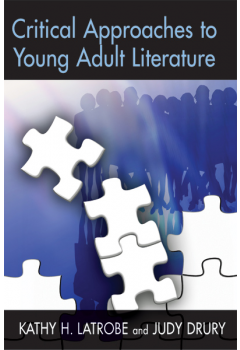Primary tabs
You don't need to be an ALA Member to purchase from the ALA Store, but you'll be asked to create an online account/profile during checkout to proceed. This Web Account is for both Members and non-Members. Note that your ALA Member discount will be applied at the final step of the checkout process.
If you are Tax-Exempt, please verify that your account is currently set up as exempt before placing your order, as our new fulfillment center will need current documentation. Learn how to verify here.
- Description
- About the author
- Reviews
With today’s digital natives, educators face new challenges in guiding young adults to discovery of the critical thinking and enjoyment that comes from lifelong literacy not to mention simply reading simply for pleasure.
For anyone seeking to hone their skills as a guide to YA reading, Latrobe and Drury give you a theoretical basis for your programming with cogent explanations of eight critical theories of literature:
• New Criticism/Formal Criticism
• Psychological Criticism
• Sociological Criticism: Relationships in Context
• Historical Criticism
• Gender Criticism: Opposite Sexes or Neighboring Sexes?
• Archetypal/Mythological Criticism
• Popular Culture and Criticism
• Reader-Response: A Unique Literary Event
Critical Approaches to Young Adult Literature is for librarians in school and public libraries (plus their colleagues across the curriculum) who strive for collections and programming that elicit thoughtful responses and build higher-level literacy skills across grades 6–12. The authors explore all facets of creating a vibrant YA reading community such as inquiry-based learning, promoting and motivating reading, collection management, understanding multiple intelligences, accepting diverse beliefs, and acting as a change agent to name a few. Latrobe and Drury also provide basic questions designed to involve young people, activities to encourage critical responses and bibliographies of YA books with annotations.
Kathy H. Latrobe and Judy Drury
Kathy H. Latrobe and Judy Drury
"This volume could be used as a textbook and equally would be useful for any children's librarian or teacher interested in evaluating and analyzing young adult literature...highly recommended for any professional who deals with the literacy needs of young adults."
--Australian Library Journal "Teacher-librarians can push the thinking about what teens read by exploring the excellent ideas in this book without destroying the fun of reading widely. Learn the techniques beyond just enjoying the plot together and recommending other books to read."--Teacher Librarian "This book shows how critical theory can inform the programming and collecting practices in libraries that serve teenage readers. The authors persuasively argue that librarians can play an important role in helping young adults develop their critical reading skills."--Children's Literature Association Quarterly "I have not seen a better tool for anyone - English teachers, librarians, media specialists, or literacy coaches ... a valuable resource for anyone seeking to pull a lesson plan for a given piece ... For anyone involved in promoting the development of literacy as a life-long practice, this is an invaluable resource."--YALS "The annotations are so excellent they could justify purchasing this title ... An excellent resource for all librarians serving grades 6-12 and librarians unfamiliar with literary critical models."--Catholic Library World "This ambitious, user-friendly book provides a guide to young adult (YA) literature, an understudied field. The annotated bibliographies, as a whole, offer an admirable overview of major texts in this rapidly changing field ... a valuable reference for those interested in children's literature, education, or library science. Highly recommended."--CHOICE "Particularly strong in its specific examples of applying critical theories to individual YA texts and its provision of relevant activities ... offers an interesting bridge between literary criticism and young adult reading."--Bulletin of the Center for Children's Books



